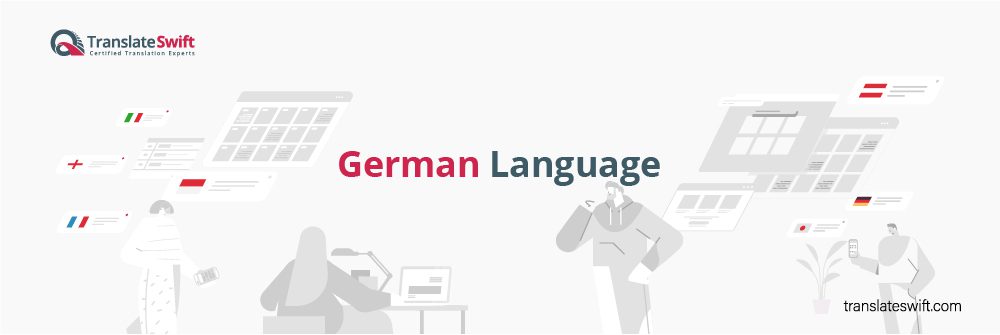
A Rich Tapestry of History and Culture
Celebrated for its precision and intricacy, the German language is a tribute to the deep cultural and historical fabric that unites the German-speaking world. German has been spoken as a native tongue by over 90 million people worldwide and has developed into one of the most influential languages in the world with roots that go back millennia.
History and Origin:
The earliest Germanic tribes that lived in Central Europe in the first millennium BCE are the source of the German language. These tribes spoke mutually intelligible languages that eventually combined to become what is now known as Old High German. These tribes included the Saxons, Franks, and Alamanni. Old High German had major phonological, morphological, and lexical changes throughout time as a result of interaction with adjacent languages and cultural interchange, which eventually gave rise to Middle High German during the medieval era. Modern Standard German emerged as a result of the language’s rapid standardization following the invention of the printing press in the fifteenth century.
General Information:
German is a language belonging to the Indo-European family that is categorized as West Germanic. It is known for its complicated grammar and structure. German is unique among languages because of its three-gender system of grammatical gender, which affects how nouns, adjectives, and pronouns declension. The genders are feminine, masculine, and neuter. Furthermore, the four grammatical cases in German—nominative, accusative, dative, and genitive—control the meaning of nouns and the modifiers that go with them. German is known for its strict grammar, but it actually has a very flexible word structure that makes it possible to create compound words that effectively express multiple ideas in a single phrase.
Countries and Regions:
The German language is officially recognized in a number of adjacent nations and territories, while its primary homeland is Germany. In Austria, regional dialects like Austro-Bavarian coexist with German as the primary language of communication. In Switzerland, German is also extensively spoken, especially in the central and eastern regions where it coexists with Romansh, French, and Italian. German is also recognized as an official language in the Grand Duchy of Luxembourg, where it is used alongside French and Luxembourgish, as well as the principality of Liechtenstein. The fact that there are sizable German-speaking populations in various regions of Belgium, Italy (South Tyrol), and Eastern Europe further emphasizes the language’s extensive reach.
Cultural Significance:
German culture, which is well-known for its contributions to science, philosophy, music, and literature, has had a significant influence on international affairs. German-speaking areas have shaped the globe in many ways, from the revolutionary scientific theories of Max Planck and Albert Einstein to the literary classics of Friedrich Schiller and Johann Wolfgang von Goethe. Germany’s vibrant customs, festivals, food, and architecture all showcase its rich cultural legacy, which further enhances its appeal as a major cultural force in Europe and beyond.
At TranslateSwift, we understand how crucial precise and trustworthy translation services are to removing language barriers and promoting intercultural dialogue. Our staff of expert translators is available to help with any type of translation you need, including legal certifications, academic transcripts, visa applications, and personal letters. Our proficiency in translating from German to English and vice versa enables us to guarantee accuracy, professionalism, and cultural sensitivity in each assignment, giving you the confidence and comfort to handle linguistic challenges.
For more information please visit our German translation services page.
Other Languages
- English
- Spanish
- German
- Dutch
- French
- Italian
- Afrikaans
- Albanian
- Amharic
- Arabic
- Armenian
- Azerbaijani
- Basque
- Belarusian
- Bengali
- Bosnian
- Bulgarian
- Cantonese
- Catalan
- Cebuano
- Chichewa
- Chinese - Simplified
- Chinese - Cantonese
- Chinese - Traditional
- Chinese - Mandarin
- Corsican
- Croatian
- Creole
- Czech
- Danish
- Dari
- Esperanto
- Estonian
- Farsi
- Filipino
- Finnish
- Frisian
- Galician
- Georgian
- Greek
- Gujarati
- Haitian Creole
- Hausa
- Hawaiian
- Hebrew
- Hindi
- Hmong
- Hungarian
- Icelandic
- Igbo
- Indonesian
- Irish
- Japanese
- Javanese
- Kannada
- Kazakh
- Khmer
- Korean
- Kurdish
- Kyrgyz
- Lao
- Latin
- Latvian
- Lithuanian
- Luxembourgish
- Macedonian
- Malagasy
- Malay
- Malayalam
- Maltese
- Maori
- Marathi
- Mongolian
- Montenegrin
- Myanmar
- Nepali
- Norwegian
- Odia
- Pashto
- Persian
- Polish
- Portuguese
- Punjabi
- Romanian
- Russian
- Samoan
- Scots Gaelic
- Serbian
- Sesotho
- Shona
- Sindhi
- Sinhala
- Slovak
- Slovenian
- Somali
- Sundanese
- Swahili
- Swedish
- Tajik
- Tagalog
- Tamil
- Telugu
- Thai
- Turkish
- Ukrainian
- Urdu
- Uyghur
- Uzbek
- Vietnamese
- Welsh
- Xhosa
- Yiddish
- Yoruba
- Zulu
